
Harold Clayton Lloyd Sr. was an American actor, comedian, and stunt performer who appeared in many silent comedy films.
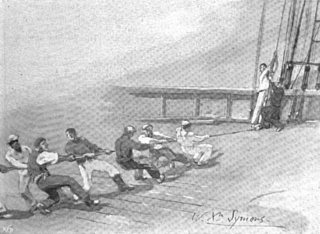
A sea shanty, shanty, chantey, or chanty is a genre of traditional folk song that was once commonly sung as a work song to accompany rhythmical labor aboard large merchant sailing vessels. The term shanty most accurately refers to a specific style of work song belonging to this historical repertoire. However, in recent, popular usage, the scope of its definition is sometimes expanded to admit a wider range of repertoire and characteristics, or to refer to a "maritime work song" in general.

Phyllis Virginia "Bebe" Daniels was an American actress, singer, dancer, writer, and producer.

42nd Street is a 1933 American pre-Code musical film directed by Lloyd Bacon, with songs by Harry Warren (music) and Al Dubin (lyrics). The film's numbers were staged and choreographed by Busby Berkeley. It stars an ensemble cast of Warner Baxter, Bebe Daniels, George Brent, Ruby Keeler, Dick Powell and Ginger Rogers.

Ben Lyon was an American film actor and a studio executive at 20th Century-Fox who later acted in British radio, films and TV.
Carlotta is a fictional character from Gaston Leroux's 1910 novel The Phantom of the Opera. She is the leading soprano at the Paris Opera House who is criticised by the narrator and the Phantom for the lack of emotion in her performances.
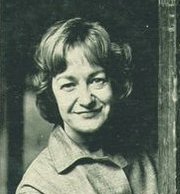
Isla Cameron was a Scottish-born, English-raised actress and singer. AllMusic noted that "Cameron was one of a quartet of key figures in England's postwar folk song revival – and to give a measure of her importance, the other three were Ewan MacColl, A. L. Lloyd, and Alan Lomax". She was a respected and popular folk music performer through the 1950s and early 60s as well as appearing in several films; she focused almost exclusively on her acting career from 1966 onwards. Cameron provided the singing voice for actress Julie Christie's part in the hit 1967 film version of Thomas Hardy's Far From the Madding Crowd, but changed career direction and became a film researcher in the early 1970s before her early death in a domestic accident in 1980. One of the traditional songs in her repertoire, "Blackwaterside", recorded by Cameron in 1962, was subsequently popularised by notable "next generation" U.K. folk music performers Anne Briggs, Bert Jansch and Sandy Denny.
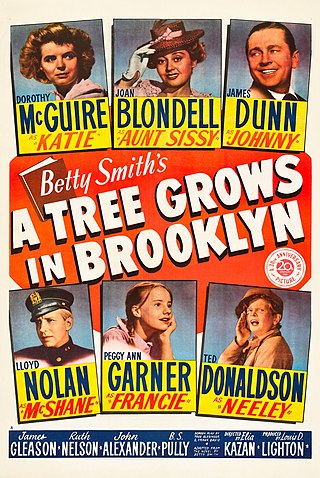
A Tree Grows in Brooklyn is a 1945 American drama film that marked the debut of Elia Kazan as a dramatic film director. Adapted by Tess Slesinger and Frank Davis from the 1943 novel by Betty Smith, the film focuses on an impoverished but aspirational, second-generation Irish-American family living in the Williamsburg neighborhood of Brooklyn, New York, in the early 20th century. Peggy Ann Garner received the Academy Juvenile Award for her performance as Francie Nolan, the adolescent girl at the center of the coming-of-age story. Other stars are Dorothy McGuire, Joan Blondell, Lloyd Nolan, Ted Donaldson, and James Dunn, who received the Academy Award for Best Supporting Actor for his portrayal of Francie's father.
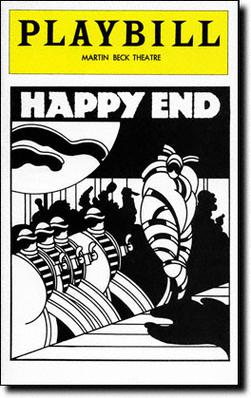
Happy End is a three-act musical comedy by Kurt Weill, Elisabeth Hauptmann, and Bertolt Brecht which first opened in Berlin at the Theater am Schiffbauerdamm on September 2, 1929. It closed after seven performances. In 1977 it premiered on Broadway, where it ran for 75 performances.
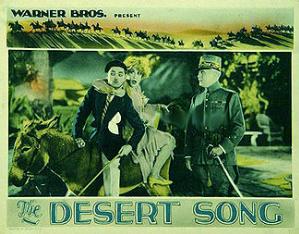
The Desert Song is a 1929 American pre-Code operetta film directed by Roy Del Ruth and starring John Boles, Carlotta King, Louise Fazenda, and Myrna Loy. It was photographed partly in two-color Technicolor, the first film released by Warner Bros. to include footage in color. The film included a 10-minute intermission during which music was played.
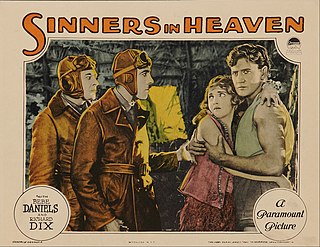
Sinners in Heaven is a 1924 American silent island romantic drama film directed by Alan Crosland and released through Paramount Pictures. It is based on the novel of the same name by Clive Arden and stars Richard Dix and Bebe Daniels in the principal roles.
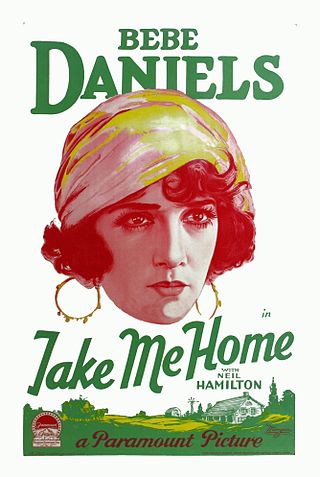
Take Me Home is a 1928 silent comedy produced by Famous Players–Lasky and distributed by Paramount Pictures. Due to the public apathy towards silent films, a sound version was also prepared. While the sound version has no audible dialog, it was released with a synchronized musical score with sound effects using both the sound-on-disc and sound-on-film process. The film was directed by Marshall Neilan and starred Bebe Daniels and Neil Hamilton.

The Exciters is a 1923 American silent romantic comedy film produced by Famous Players–Lasky and distributed through Paramount Pictures. It is based on a 1922 Broadway play of the same name by Martin Brown. This film was directed by Maurice Campbell and stars Bebe Daniels, then a popular Paramount contract star. On the Broadway stage, Bebe Daniels's role of Ronnie Rand was played by Tallulah Bankhead.

The Dancin' Fool is a surviving 1920 American silent romantic comedy film produced by Famous Players–Lasky and distributed by Paramount Pictures. Sam Wood directed this one of his earliest efforts. Wallace Reid and Bebe Daniels star, at the time Paramount was making them a popular team in replacement of Reid's previous female lead Ann Little. A copy of this film survives in the collection of the Museum of Modern Art, New York.

The Phantom of the Opera at the Royal Albert Hall is a 2011 British concert film adaptation of Andrew Lloyd Webber's 1986 musical The Phantom of the Opera, which in turn was based on the novel of the same name by Gaston Leroux.

Registered Nurse is a 1934 American Pre-Code drama film produced by First National Pictures and released through its parent company Warner Bros. The film was directed by Robert Florey and stars Bebe Daniels in her final role for Warner Bros.

Below the Surface is a surviving 1920 American silent drama film directed by Irvin Willat and starring Hobart Bosworth. Thomas H. Ince produced the picture with distribution through Paramount Pictures.

Argentine Love is a 1924 American silent romantic drama film directed by Allan Dwan and based on a short story by Vicente Blasco Ibanez that stars Bebe Daniels.

The Crowded Hour is a 1925 American silent drama film directed by E. Mason Hopper and starring Bebe Daniels. It was produced by Famous Players–Lasky and distributed by Paramount Pictures. It is based on the 1918 Broadway play, The Crowded Hour, by Channing Pollock and Edgar Selwyn.

Charles Kenneth Thomson was an American character actor active on stage and on film during the silent and early sound film eras.




















